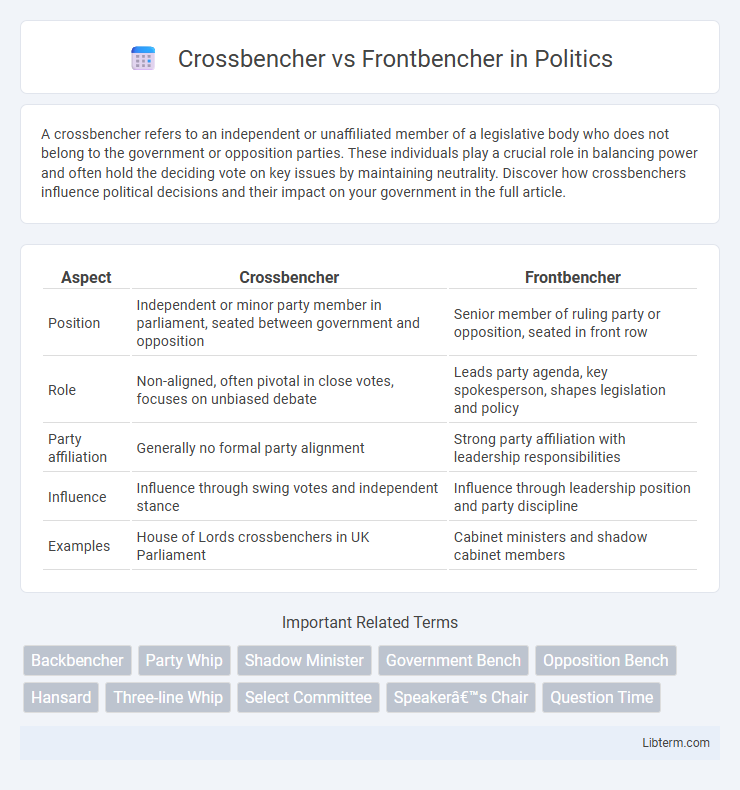A crossbencher refers to an independent or unaffiliated member of a legislative body who does not belong to the government or opposition parties. These individuals play a crucial role in balancing power and often hold the deciding vote on key issues by maintaining neutrality. Discover how crossbenchers influence political decisions and their impact on your government in the full article.
Table of Comparison
| Aspect | Crossbencher | Frontbencher |
|---|---|---|
| Position | Independent or minor party member in parliament, seated between government and opposition | Senior member of ruling party or opposition, seated in front row |
| Role | Non-aligned, often pivotal in close votes, focuses on unbiased debate | Leads party agenda, key spokesperson, shapes legislation and policy |
| Party affiliation | Generally no formal party alignment | Strong party affiliation with leadership responsibilities |
| Influence | Influence through swing votes and independent stance | Influence through leadership position and party discipline |
| Examples | House of Lords crossbenchers in UK Parliament | Cabinet ministers and shadow cabinet members |
Understanding Crossbenchers and Frontbenchers
Crossbenchers are members of a legislative body who do not align with the government or official opposition, providing independent or neutral perspectives during debates and decision-making. Frontbenchers, by contrast, are prominent politicians who hold official positions as ministers or shadow ministers, responsible for leading their party's policy and legislative agenda. Understanding the role distinction highlights how crossbenchers influence bipartisan cooperation, while frontbenchers drive party strategy and governance.
Historical Background of Crossbenchers and Frontbenchers
Crossbenchers originated in the British parliamentary system as independent or minor party members who sit between the government and opposition benches, symbolizing neutrality and non-partisanship, while frontbenchers represent leading party members occupying the front rows of the parliamentary chamber, often serving as ministers or shadow ministers. Historically, frontbenchers were established to organize executive government and parliamentary opposition roles clearly, dating back to the 19th-century evolution of party politics in the UK. The emergence of crossbenchers reflects a tradition of independent political voices and non-aligned representation within legislative bodies, emphasizing the balance between party control and individual accountability.
Roles and Responsibilities: Crossbenchers vs Frontbenchers
Crossbenchers in parliamentary systems serve as independent or minor party members who provide unbiased scrutiny and hold the government accountable without direct affiliation to the ruling or opposition parties. Frontbenchers, typically senior members of the government or opposition, take on leadership roles, driving policy development, debate, and legislative agenda within their parties. While frontbenchers focus on party strategy and public representation, crossbenchers prioritize impartial assessment and balanced contribution to legislative discussions.
Political Influence and Power Dynamics
Crossbenchers hold a pivotal role by exercising independent judgment and often holding the balance of power in parliamentary votes, especially in hung parliaments where no single party has a majority. Frontbenchers, typically senior party members or ministers, wield significant political influence by shaping policy, driving legislative agendas, and maintaining party discipline from their prominent seats in government or opposition. The power dynamics reveal that while frontbenchers dominate formal decision-making, crossbenchers can sway crucial outcomes through strategic alliances and issue-based support.
Differences in Parliamentary Participation
Crossbenchers exhibit independent parliamentary participation without formal party alignment, allowing them to vote and debate based on individual judgment and constituency interests. Frontbenchers, typically senior party members or ministers, actively represent their party's policies and are directly involved in shaping government legislation and strategy during parliamentary sessions. The distinct roles impact their speaking frequency, voting patterns, and influence within parliamentary committees and debates.
Decision-Making and Policy Impact
Crossbenchers, often independent or from minor parties, influence decision-making through their pivotal votes and ability to hold the balance of power, thereby shaping policy outcomes indirectly. Frontbenchers, typically senior members of the ruling or opposition parties, directly drive legislative agendas and policy formulation as part of the executive or shadow cabinet. The distinction in policy impact lies in frontbenchers' formal roles in proposing and executing laws versus crossbenchers' strategic position in negotiating and amending legislation.
Advantages and Challenges of Each Position
Crossbenchers benefit from greater independence, enabling unbiased decision-making and fostering diverse perspectives in parliamentary debates. Frontbenchers enjoy direct influence on party policies and government formation but face pressures to conform to party lines and maintain collective responsibility. Challenges for crossbenchers include limited access to party resources and reduced visibility, while frontbenchers must balance constituency interests with party agendas, risking reputational impact if party decisions conflict with public opinion.
Public Perception and Media Representation
Crossbenchers often receive media attention for their perceived independence and balanced judgment, attracting public respect for being less influenced by party politics compared to frontbenchers. Frontbenchers are frequently portrayed as key policymakers and party leaders, drawing significant media coverage that highlights their influential roles but sometimes casting them as partisan figures. Public perception tends to view crossbenchers as neutral and pragmatic, while frontbenchers are seen as driving government agendas and party loyalty.
Notable Crossbenchers and Frontbenchers in History
Notable crossbenchers in history include independent figures such as Lord Alderdice in the UK House of Lords, known for their impartiality and pivotal role in legislative scrutiny outside party lines. Prominent frontbenchers typically comprise leading government and opposition ministers, with historical examples like Winston Churchill as a frontbench Prime Minister and Clement Attlee as a frontbench opposition leader who significantly shaped policy and governance. The distinction highlights crossbenchers' independence and frontbenchers' leadership and policy influence within parliamentary systems.
The Future of Crossbenchers and Frontbenchers
Crossbenchers are expected to play an increasingly pivotal role in parliamentary balance, offering independent perspectives that challenge party-dominated agendas. Frontbenchers, representing leading government and opposition roles, will likely focus on strategic policy development and maintaining party unity amidst evolving political landscapes. The future of both hinges on their ability to adapt to shifting voter expectations and legislative complexities in a rapidly changing political environment.
Crossbencher Infographic

 libterm.com
libterm.com